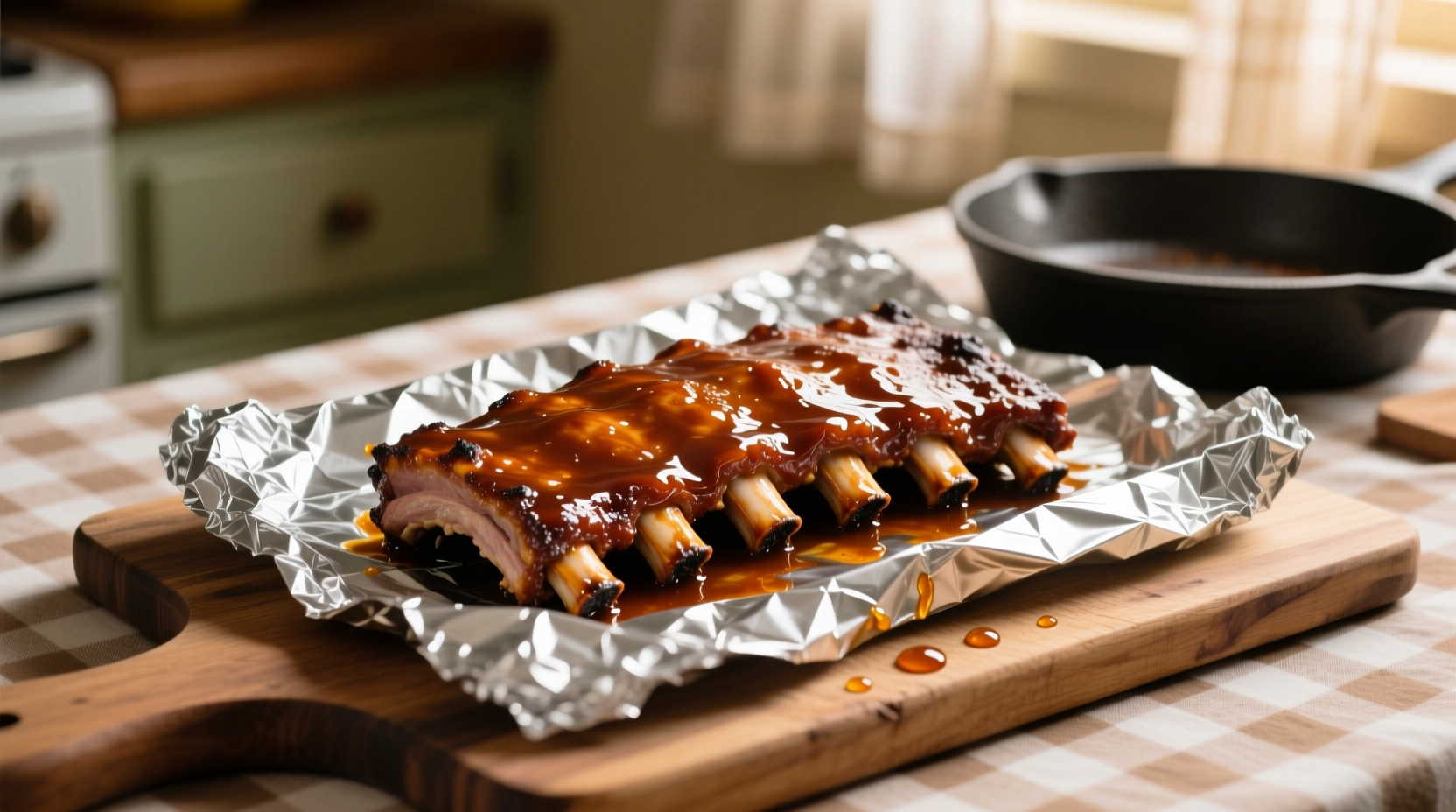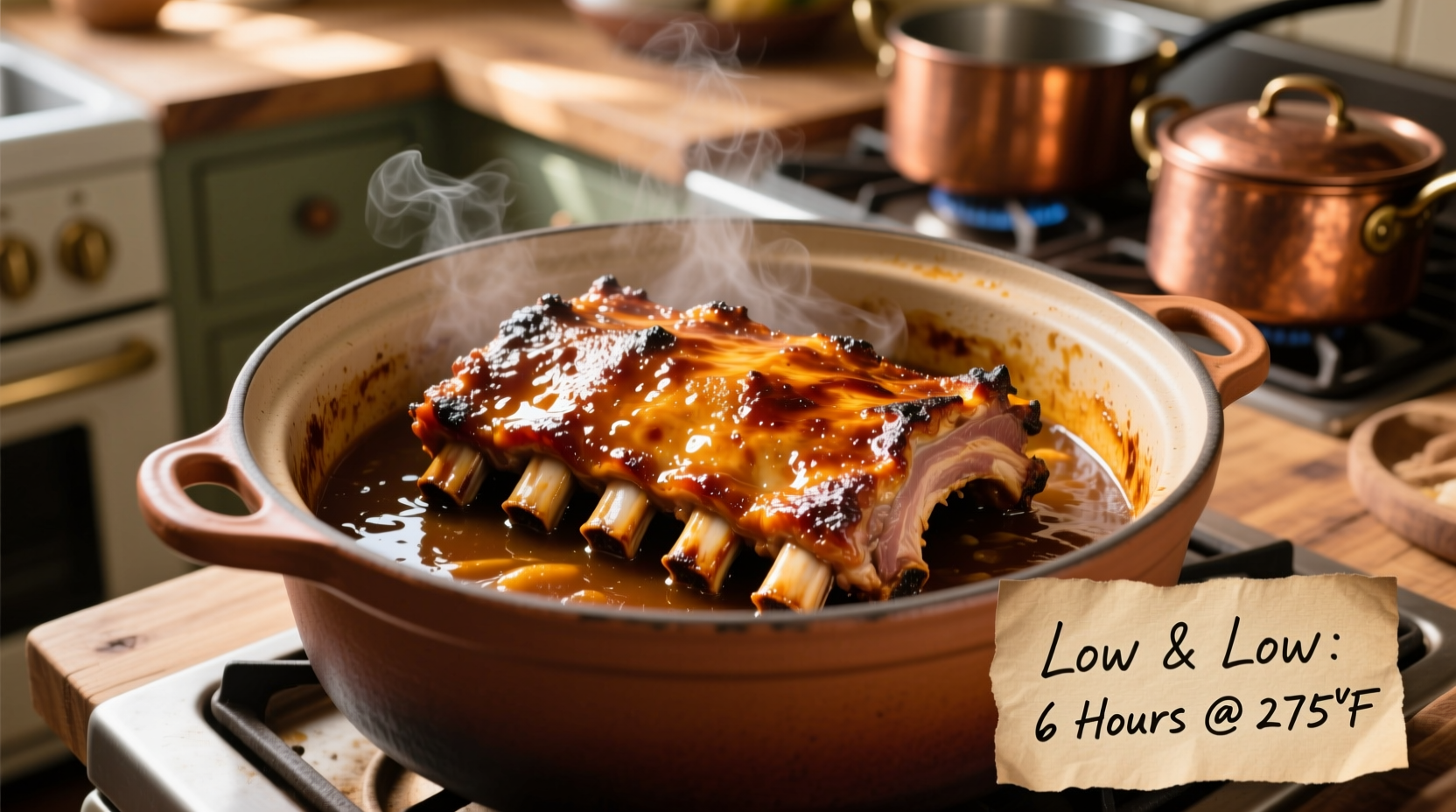Mastering slow-cooked ribs transforms tough cuts into succulent, flavorful meals through low-and-slow cooking that breaks down collagen. Whether you're using an oven, slow cooker, or smoker, understanding the science behind slow cooking ensures restaurant-quality results at home. This guide delivers precise timing, temperature control, and professional techniques that guarantee perfect ribs every time.
Why Slow Cooking Works for Ribs
Ribs contain abundant connective tissue that requires time and moisture to transform into gelatin. The ideal temperature range of 225-275°F allows collagen to break down gradually without drying out the meat. At 160°F, collagen begins converting to gelatin, creating that signature tender texture. Cooking below 200°F risks undercooking, while exceeding 300°F can cause the meat to become tough before the collagen fully breaks down.
| Rib Type | Recommended Time | Internal Temperature | Doneness Indicator |
|---|---|---|---|
| Baby Back Ribs | 3-4 hours | 195-203°F | Bend test with slight droop |
| Spare Ribs | 4-6 hours | 200-205°F | Meat retracts 1/4 inch from bones |
| St. Louis Cut | 4-5 hours | 195-203°F | Bones slide out easily |
Essential Preparation Steps
Proper preparation sets the foundation for exceptional slow-cooked ribs. Start by removing the membrane from the bone side using a butter knife to lift an edge, then grip with a paper towel and peel away. This allows seasoning to penetrate and prevents shrinkage during cooking. Trim excess fat to about 1/4 inch thickness for optimal rendering. Apply a dry rub evenly, pressing it into the meat, and let rest for at least 30 minutes before cooking.

Step-by-Step Cooking Methods
Oven Method
Preheat your oven to 250°F. Place ribs bone-side down on a foil-lined baking sheet. Cook uncovered for 2 hours, then wrap tightly in foil with 1/4 cup apple juice or broth. Return to oven for 1-2 more hours until tender. Unwrap, brush with sauce, and broil for 3-5 minutes to caramelize.
Slow Cooker Method
For electric slow cookers, set to low for 6-8 hours. Place ribs upright between the sides of the cooker. Add 1 cup liquid (apple cider, broth, or cola) to the bottom. No additional wrapping is needed as the slow cooker maintains moisture. Check tenderness after 6 hours and finish with sauce during the last 30 minutes.
Smoker Method (3-2-1 Technique)
Smoke ribs at 225°F for 3 hours unwrapped. Wrap in foil with 2 tablespoons butter and 1/4 cup liquid for 2 hours. Unwrap and cook for 1 final hour with sauce. This method creates exceptional smoke flavor while ensuring tenderness. The USDA recommends cooking pork to 145°F with a 3-minute rest for safety, but ribs require higher temperatures (195°F+) for proper texture (USDA Food Safety).
Temperature Timeline for Perfect Ribs
Understanding the temperature progression helps anticipate when ribs will reach ideal tenderness. During the first 2 hours, the internal temperature rises steadily to about 150°F. Between hours 2-4, the temperature stalls around 160-170°F as collagen breaks down - this is normal and crucial for tenderness. After 4 hours, the temperature rises again as the meat becomes fully tender. The bend test (gently lifting ribs with tongs to see a 45-degree bend) confirms doneness better than timing alone.
Finishing Techniques for Maximum Flavor
Apply sauce during the final 30-60 minutes to prevent burning. For caramelized edges, broil for 3-5 minutes after saucing. Always let ribs rest for 10-15 minutes before cutting to allow juices to redistribute. Cutting between bones with a sharp knife preserves presentation. Serve with complementary sides like coleslaw and cornbread for a complete meal.
Troubleshooting Common Issues
Dry ribs: Usually caused by insufficient moisture during cooking. Always include liquid when wrapping and avoid exceeding 275°F. Tough ribs: Indicates insufficient cooking time or temperature too low to break down collagen. Extend cooking time by 30-60 minutes. Burnt exterior: Results from finishing too close to heat source or applying sauce too early. Keep ribs at least 6 inches from broiler element and apply sauce later in the process.
Serving and Storage Guidelines
Serve ribs immediately for best texture. Leftovers store well in airtight containers in the refrigerator for 3-4 days. Reheat in a 250°F oven wrapped in foil with a splash of liquid to maintain moisture. For longer storage, freeze portions for up to 3 months. Thaw in the refrigerator before reheating. Never leave cooked ribs at room temperature for more than 2 hours to prevent foodborne illness.











 浙公网安备
33010002000092号
浙公网安备
33010002000092号 浙B2-20120091-4
浙B2-20120091-4